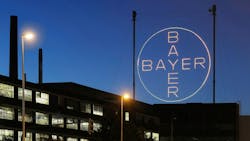Bayer says tariff threat is manageable, will not adjust global manufacturing footprint
German pharmaceutical and agricultural company Bayer said the potential impact of tariffs is manageable and it doesn’t see a need to adjust its manufacturing footprint in Europe and the United States.
Asked if Bayer plans to manufacture more in the U.S. given the potential threat of tariffs on pharmaceuticals from the Trump administration, CEO Bill Anderson in a Tuesday media briefing said that the company has no immediate plans to “revisit” its global manufacturing footprint which he said is “balanced” worldwide.
“We have considerable manufacturing in both the U.S. and in Europe and we have sort of a rough balance,” Anderson said. “We have an optimized production network that really benefits from being able to focus production say of one product in Germany and another product in the U.S. We can ship back and forth. That’s a real benefit for the company. That’s a benefit for consumers because it allows us to keep our prices lower.”
CFO Wolfgang Nickl said that while tariffs should have limited direct effects on Bayer’s crop science business, when it comes to pharmaceuticals Bayer expects to see “certain direct effects on parts of our portfolio, mainly product flows between the U.S. and China” with an additional risk for its European Union production footprint, as the Trump administration considers tariffs on pharma imports from Europe.
However, Nickl contends that Bayer will be able to manage any potential impact of tariffs on pharmaceuticals and doesn’t see a need to revise its 2025 guidance.
Based on current tariff announcements and Bayer’s mitigation measures, including maintaining the stability of its supply chains, the company expects to manage the impact and “confirms our outlook at constant currencies for the full year 2025,” Nickl said.
Anderson commented that the current geopolitical and economic uncertainty is top of mind at Bayer and in a more certain environment the company “likely would have adjusted our guidance for pharmaceuticals upward, but given the uncertainty around tariffs we feel it’s prudent to reaffirm what we said in March and then closely monitor developments.”
For now, Bayer expects its pharmaceutical business to come in at the upper end of its 2025 outlook in both the top and bottom lines, according to Anderson, who added that the company is “keeping a close eye” on the macroeconomic environment and “will adapt as required.”
Last month, Bayer announced the opening of a 70,000-square-foot expansion at its Myerstown, Pennsylvania manufacturing site, following a $44 million investment aimed at boosting production capacity and modernizing operations.
The expansion includes eight new product packaging lines and automated logistics systems to streamline delivery of consumer health products such as Aleve, Claritin, and Alka-Seltzer Plus. The Myerstown site, which has operated for over 75 years, is now the largest manufacturing facility in Bayer’s global Consumer Health network producing more than 50% of Bayer North American brands.
On Monday, Bayer announced that it is reorganizing its crop science division in terms of crop protection production and R&D in Germany to help bolster its global competitiveness. Under the reorganization, the company will shed 200 jobs and halt the production of generic active ingredients.
“Manufacturers of generic crop protection products, particularly from Asia, have built significant overcapacity over recent years and are pushing onto the market with persistently low prices, some of which are below the manufacturing costs of crop protection products in Europe,” Bayer said in a statement.
About the Author
Greg Slabodkin
Editor in Chief
As Editor in Chief, Greg oversees all aspects of planning, managing and producing the content for Pharma Manufacturing’s print magazines, website, digital products, and in-person events, as well as the daily operations of its editorial team.
For more than 20 years, Greg has covered the healthcare, life sciences, and medical device industries for several trade publications. He is the recipient of a Post-Newsweek Business Information Editorial Excellence Award for his news reporting and a Gold Award for Best Case Study from the American Society of Healthcare Publication Editors. In addition, Greg is a Healthcare Fellow from the Society for Advancing Business Editing and Writing.
When not covering the pharma manufacturing industry, he is an avid Buffalo Bills football fan, likes to kayak and plays guitar.
